|
The Long
Road
Home Project:
Finding a Voice
on the Open Road
Marie B.
Tracy, Capt, USAFR |
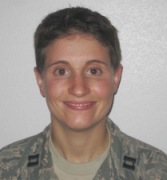 |
This summer, I will go on a journey with
four other U.S. military veterans.
Together, we will ride our bicycles
approximately 3,800 miles from Aberdeen,
Washington to Washington D.C. We are
partaking in this adventure as part of
the Long Road Home Project, an endeavor
that aims to help veterans heal their
war wounds, bring awareness to the
difficult transitory period that many
service people face when returning home,
and raise money to support other
veterans. We each have a different
reason for riding, a goal to accomplish,
or an internal struggle that we hope to
overcome. Riding across the continent, a
bicycle will be my vehicle for
projecting my voice for the first time
in the wake of Don’t Ask, Don’t Tell’s
repeal.
What did
DADT mean to a gay service person? Between 1994
and last year, 13,500 people were discharged
from the service under the policy. In some
cases, Soldiers, Sailor, Marines, Coast
Guardsmen and Airmen received less than
honorable discharges after multiple deployments
to Iraq and Afghanistan, solely because
vindictive peers outed these individuals to
their commanders. DADT was a blatant violation
of free speech, due process and equal protection
under the First, Fifth and Fourteenth
Amendments, respectively. Its entire basis was
unconstitutional, its implementation
discriminatory and its nature inhumane. Somehow,
the policy continued through three presidential
administrations and 17 years, while thousands of
gay service members served their country
silently.
Unfortunately, this silence described much of my
experience in the Air Force. Ironically, people
who know me would say that speaking has never
been difficult for me. I’ve never been at a loss
for words…or volume, for that matter. In fact,
entering the military was rather like a godsend,
as I just seemed to have a built-in “command
voice.” At the age of 17, I decided to join the
military when I applied for a ROTC scholarship.
Coming from a long line of military officers, I
wanted nothing more than to serve my country.
ROTC was also a way to pay for college. Two
weeks after I learned that I would be receiving
an Air Force ROTC scholarship, I realized that I
was gay. I pressed on, though, and became an Air
Force ROTC cadet in August of 2002, despite my
worries about the challenges that I might face
under “Don’t Ask, Don’t Tell.”
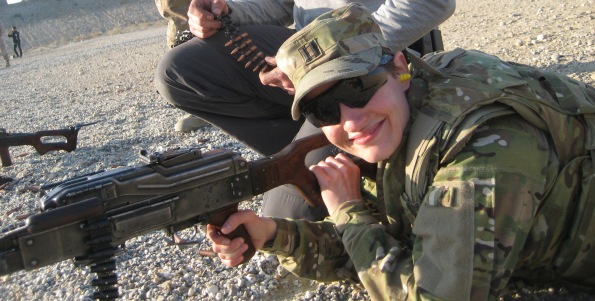
I believed
and still believe that once I committed to
something, I committed all the way. This
translated into my complete dedication to ROTC
and to being the best cadet in my detachment. Of
course, everyone assumed that because I was a
“great” cadet, I loved being in ROTC, which was
far from the truth. I was in the closet while
attending a Jesuit University. Only a handful of
my friends knew that I was gay; many of them
were the other closeted students on campus. I
came out to my parents during my junior year of
college because I wasn’t sure if I could
commission, and I needed them to understand why.
I wanted to serve my country, but the thought of
lying to myself and those around me for another
four years made me physically ill. On a daily
basis, I was being conditioned to correlate
hiding with having the ability to serve, despite
the fact that honesty and personal integrity are
values that I hold second to none, along with
other members of the Armed Forces. As a result,
I decided to commission into the United States
Air Force Reserve, which I viewed as the best of
both worlds. That way, I would have the
opportunity to serve my country, while knowing
that my civilian life in New York would provide
me with a more open, supportive environment. On
May 19, 2006, I received my Oath of Office from
my 96-year old grandfather, a retired Colonel in
the United States Marine Corps. Though one of
the proudest moments in my life, “Don’t Ask,
Don’t Tell” still forced me to have to reconcile
who I am with what I wanted to be.
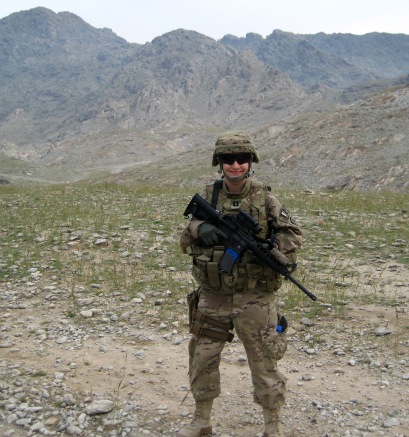 |
Over the last
decade as a cadet and Air Force Reserve
officer, the Air Force has afforded me
some incredible opportunities. As cadet
commander of my ROTC detachment, I
opened the New York Stock Exchange with
a three-star general. I commanded my
fellow cadet corps up Fifth Avenue on
Veterans’ Day. I commissioned in the
historical rotunda of Columbia
University’s Low Library. Twice I have
traveled to Afghanistan as a logistics
officer; the first time was less than
six months after my commissioning date.
Undoubtedly the most valuable experience
was my recent deployment to Afghanistan,
where I worked as a logistics advisor
for the last six months with the Afghan
National Police (ANP). I worked
hand-in-hand with the ANP logistics
staff at a regional training center in
Nangarhar Province, advising my
counterparts on ways to improve and
establish long-term, sustainable
logistics processes. I developed close
relationships with many of these
individuals and learned about the lives
and experiences of my Afghan
counterparts. |
I did not
speak about these incredible events in my
civilian life. When I returned from my first
deployment to Afghanistan in early 2007, I came
out of the closet. I moved back to New York,
started my job at Columbia, pursued my Master’s
degree, and fulfilled my Reserve duty twice a
month. “How was drill?” my New York City friends
would ask. “Okay” was my standard response.
Instead of sharing the challenges of being a
young Lieutenant with them, I kept these
experiences to myself. Similarly, when I donned
my uniform, I was silent about the rest of my
life. On my Reserve base, I didn’t have many
military friends, other than the other
Lieutenant in my unit. I just didn’t see how I
really could have many friends. Instead, I chose
to shut myself off from that possibility.
It was not
until I pinned on my captain rank that I
realized how I needed to stop segregating the
different aspects of who I am. I became
associated with the military at the exact same
time that I realized that I was gay. How could I
separate these two experiences? Even more so, I
was invested in the well-being of my unit and my
Airmen. There were so many things that I was
able to accomplish for my Airmen because I was a
captain. I was able to make a difference in
their lives. So, finally, about eight years
after I became a cadet, I started becoming okay
with the entirety of me: I am a military
officer. I also happen to be gay. I am proud of
both of those aspects of my life, as my
experiences have strengthened my capabilities as
a military leader.
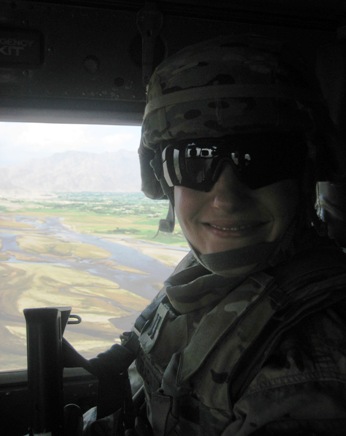 |
On
September 20, 2011, while attending
advisor training at Fort Polk,
Louisiana, I witnessed the end of “Don’t
Ask, Don’t Tell.” Since that time, I
have experienced something that I never
in a million years would have ever
dreamed of living through: the
military’s transition to open service.
More importantly, like so many other
LGBTQ service members, I have been a
part of this transition myself. My
deployment from November 2011 to May
2012 was a microcosm of the military’s
transition. I was on a small regional
training center with two other Air Force
officers, a few Marines, an Army
platoon, a Jordanian gendarmerie section
and about 30 or so contractors. Within
the confines of this little camp, I
began to come out. The biggest misnomer
about “coming out” was what it actually
entailed. Mine wasn’t a formal process.
I didn’t unveil a pride flag or make an
official announcement. This transition
involved little actions…choosing to take
a little step, when I wouldn’t have
taken that step six months ago. I didn’t
censor the pictures that I hung on my
wall. When two wedding invitations
arrived and my contractor friends asked
what I had received, I didn’t hide my
mail. Instead, showing them the
invitations sparked a conversation about
|
|
marriage equality and the Defense of
Marriage Act. A fellow captain and
I had numerous discussions about if and
when the military would choose to
re-examine its various rules and
regulations in the wake of the repeal.
In the final months of my six year
military commitment, I was finally able
to be myself. I finally began to speak. |
For the
first time in almost a decade, I can be myself.
I do not have to lie anymore. I can tell stories
without censoring pronouns or wondering if the
listener is going to over-think the context.
Simply put, I no longer have to hide. This
change is best explained by an email that I
received from a friend during the middle of my
deployment. “Do you feel safer?” she asked.
Although I have been fortunate to have never
questioned my physical safety during my time in
the military, I know that many other service
members have not had similar experiences. There
are many lesbian and gay service members who
have chosen not to come out in the wake of
DADT’s repeal. Transgender service members are
not yet able to serve openly in the military.
For me, though, this transition has translated
into a daily feeling of relief. I feel relieved
that I will not lose my job for being myself,
relieved that I can be honest and open, and,
above all, relieved that I have been able to
reconcile my military self with my civilian
self.
In
comparing this deployment to my first as a
Second Lieutenant, I am struck by the resounding
differences between the two experiences. Of
course, I am not “brand new” to the Air Force
anymore. I have developed my own leadership
style over the last six years. But the most
striking difference for me was that, in not
having a hide, I was better at being me. I was
more charismatic. I could do my job better. My
troops trusted me more. I could actually see the
difference as the deployment progressed. Our
camaraderie as a little group actually grew
stronger. In transitioning to an environment of
open service, I was able to be a stronger, more
professional officer than I ever was before.
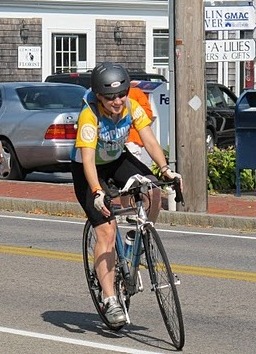 |
As
I leave the military, I plan to embark
on this next adventure in my life. I
will ride across the United States on a
bicycle with four amazing and resilient
veterans. Along the way, we will stop at
numerous military installations and meet
with hundreds of other veterans, all of
whom have their own stories to tell as
well. Each individual’s experience will
be completely unique, though we will all
be united in service to our country. We
will work our way from one town to the
next, reflecting on both our experiences
and those of our fellow service members.
Just as my military journey has allowed
me to realize that I want to become a
minister, I want nothing more than to
hear about the experiences of other
veterans and the obstacles that they
have faced in the wake of returning to
the United States. |
It’s time
for me to be a person with a voice. My
challenges as a service member have been just
that…my own. In sitting down to write this
article, it dawned on me why it has been so
difficult to articulate my experiences as a
military officer. In living in silence for four
years of ROTC and six years in the Reserve, I
have never before possessed a voice. LGBTQ
service members have served in silence. Now, for
the first time ever, many of us can try out our
new voices. We can articulate our thoughts as we
begin to integrate into the whole. Our voices
are part of the military’s dialogue. For me, the
Long Road Home Project is the opportunity to do
just that…for everyone to be included in the
dialogue of supporting veterans as they return
home. I am riding for the service that all
Airmen, Coast Guardsmen, Marines, Sailors and
Soldiers have dedicated to their country. I am
riding because, just as I am still learning
about what it means to serve as an officer who
also happens to be gay, there are hundreds of
other service members who are also learning what
it is to have a voice as a part of the United
States military.
To
learn more about the Long Road Home Project or
to donate, please visit:
http://longroadhomeproject.com/
or
http://www.stayclassy.org/events/long-road-home-project/e16367.
You can also find more information on the
Facebook page at:
https://www.facebook.com/longroadhomeUSA.
© 2012 Gay Military Signal